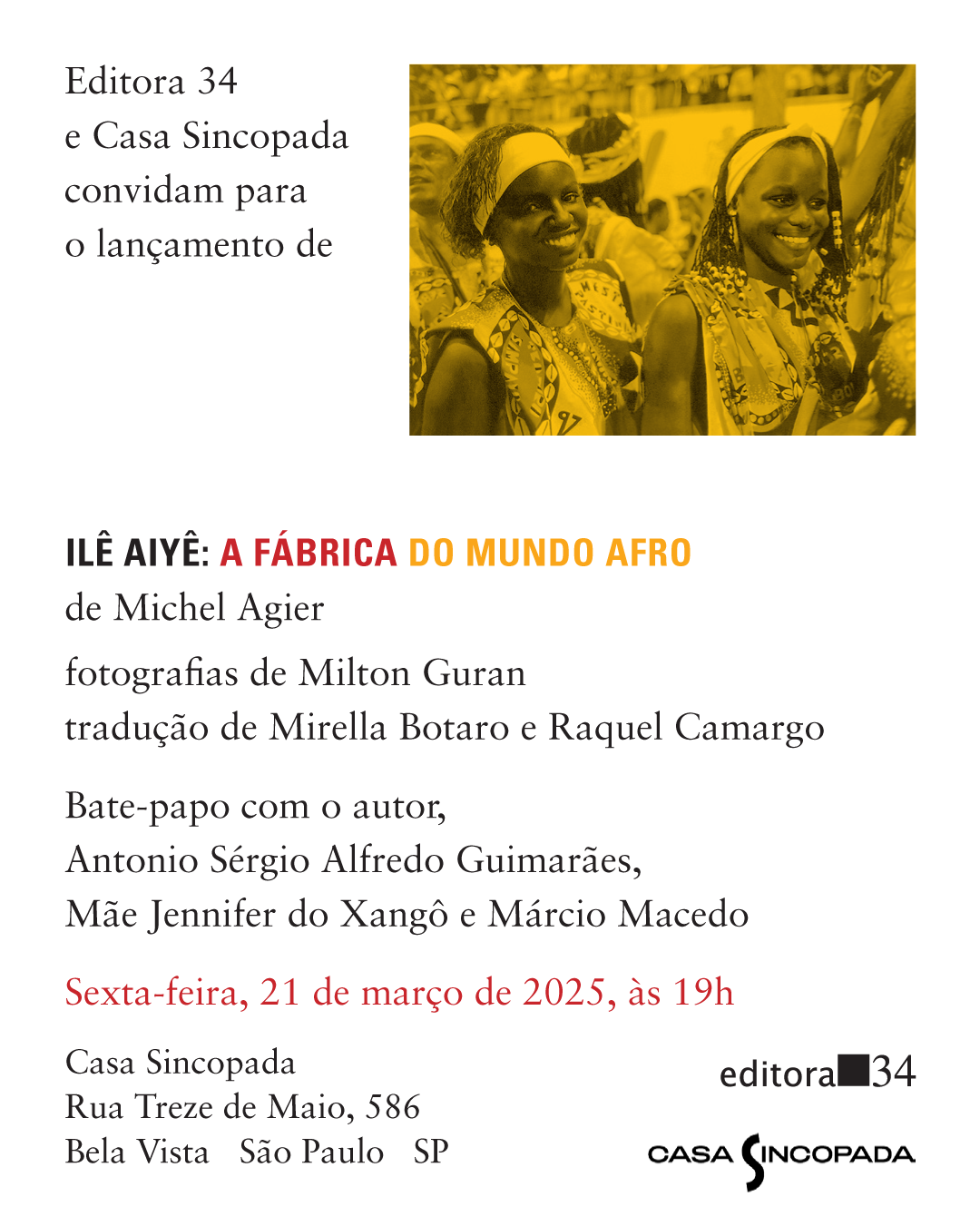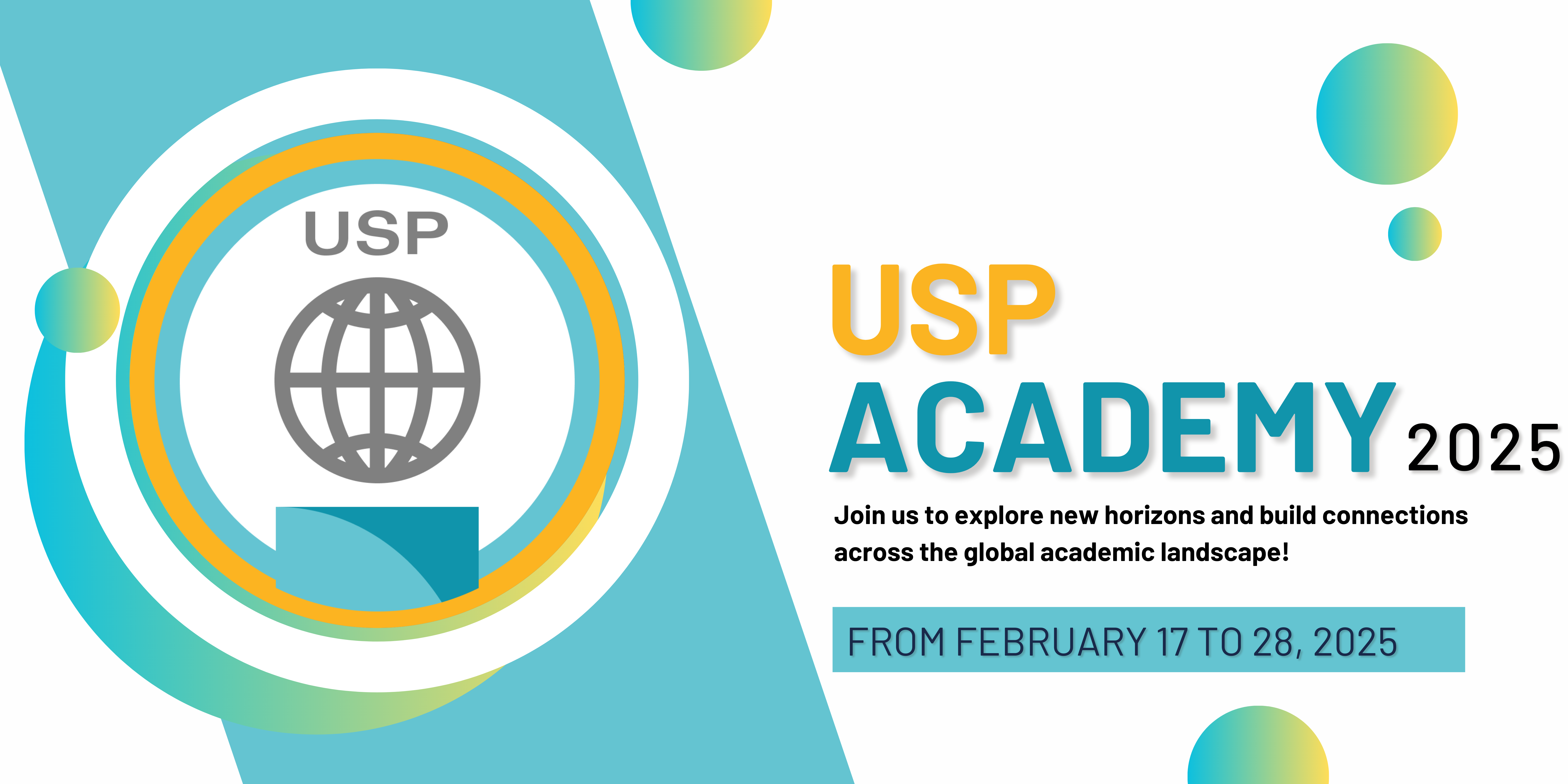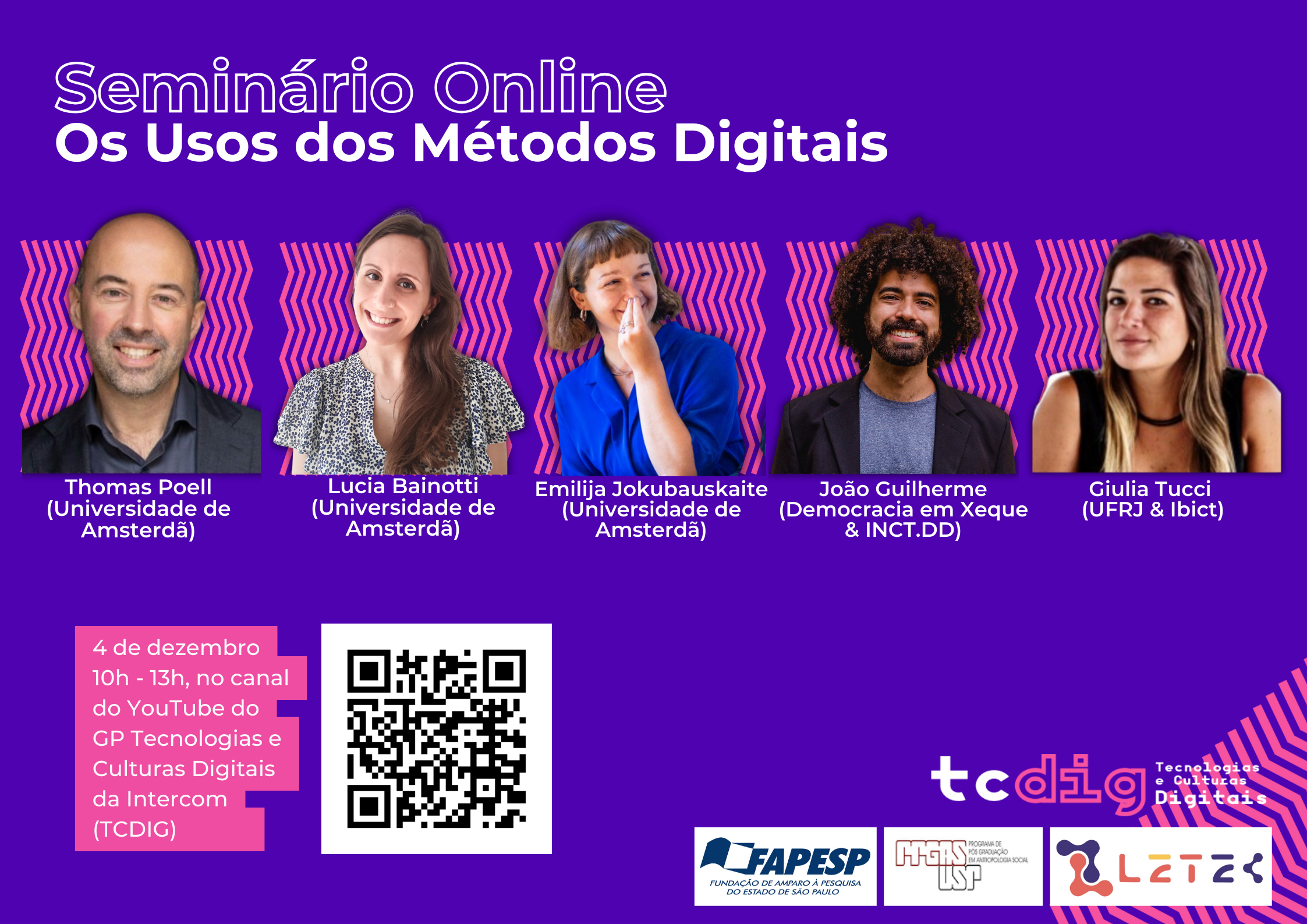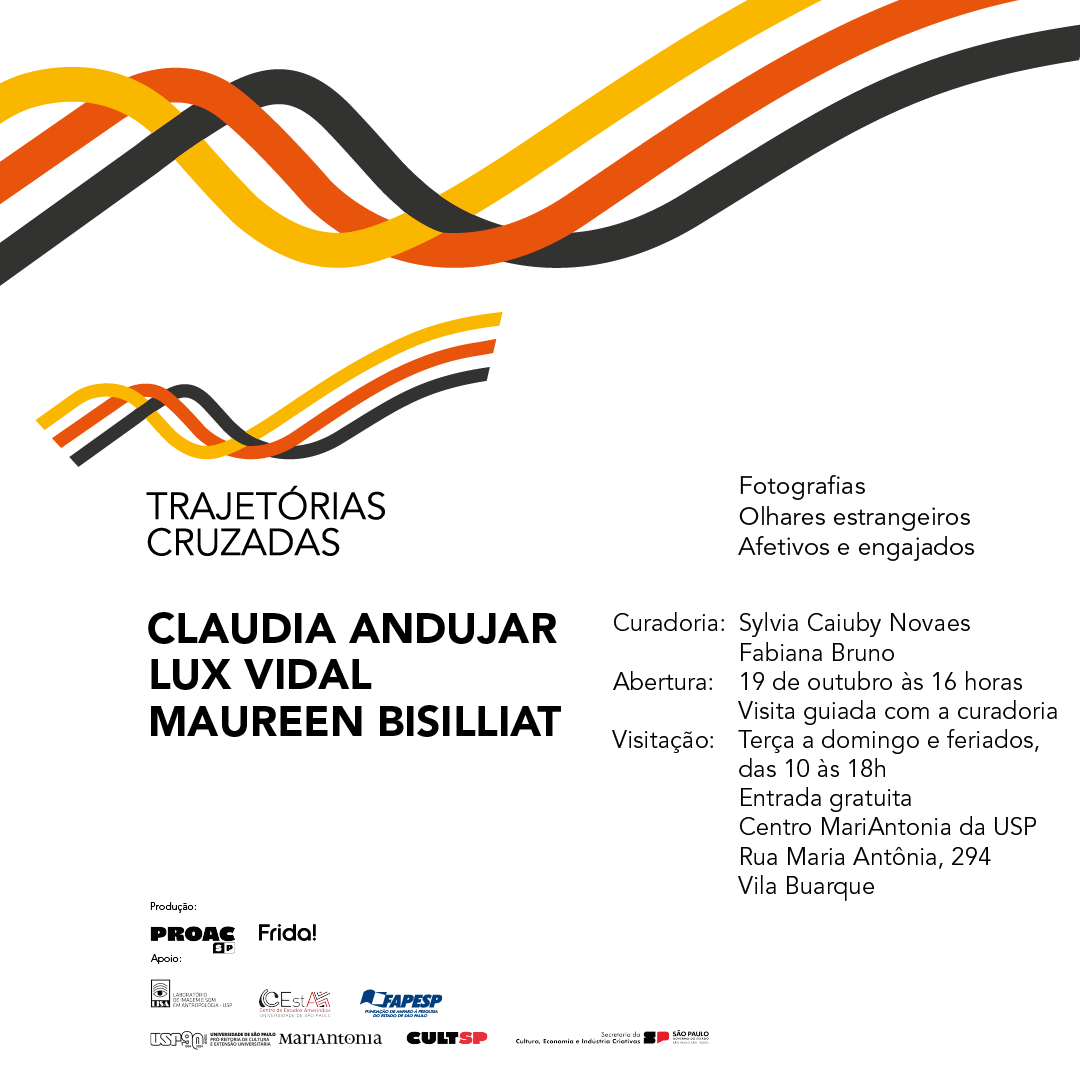Histórico PPGAS Indica
Event with the presence of Antonio Sérgio Guimarães (USP), Mother Jennifer of Xangô and Márcio Macedo (FGV), with the co-organization of Luís Michel Françoso (PPGAS), at R. Treze de Maio, 586
Inscrições até 7/11/2024, em https://internationaloffice.
The USP Academy is an initiative designed to offer participants short-term courses that introduce them to the diverse programs and research projects underway at the University of São Paulo.
Target Group: Undergraduate and Graduate students from all areas of knowledge. Cost Free of Charge.
This course aims to present a framework of possibilities for a critical approach to the cultural heritage processes of urban spaces in Brazil, based on critical perspectives arising from History and Anthropology, in research and in articles produced in Brazil, France and Spain (Catalonia).
Guest scholars (via Meet): Manuel Delgado - Universitat de Barcelona; Mônica Raisa Schpun - École des Hautes Études en Sciences Sociales.
For further details, see https://internationaloffice.
The Online Seminar on the Use of Digital Methods is coming soon, a partnership between the GP Digital Technologies and Cultures (TCDIG) and the Ethnographic Laboratory for Technological and Digital Studies (LETEC), with support from the São Paulo Research Foundation (FAPESP)!
On Wednesday, December 4th, between 10:00 and 13:00, we will be online directly on the TCDIG YouTube channel, meeting with national and international researchers and with an opening lecture by Thomas Poell from the University of Amsterdam! The seminar will discuss the combination of qualitative and quantitative research on platforms and the possibilities of studying digital culture and social networks through digital methods.
No registration is required.
Seminar Link: https://www.youtube.com/watch?
USP's MariAntonia Center opens, on October 19th, at 4 pm, the exhibition Trajectories Cruzadas with works by Claudia Andujar, Lux Vidal and Maureen Bisilliat, with approximately 300 photographs. It is curated by anthropologists Sylvia Caiuby Novaes and Fabiana Bruno. Entry is free.
The exhibition brings together, for the first time, photographs of three European women: Swiss Claudia Andujar, German Lux Vidal and English Maureen Bisilliat. They are women whose trajectories were marked by the experience of the Second World War, by having lived in many countries and mastering several languages. In Brazil, they cross similar paths, seeking and revealing a Brazil little known even by Brazilians.
Curator Sylvia explains that the artists' photography “is a way of getting to know the worlds visited and recorded, worlds very different from those they knew before coming to Brazil”. For her, “it is this perspective and this knowledge that guarantees photography's commitment to defending indigenous peoples, their territories, their culture and ways of living, something that marks their lives to this day. His photographs are a clear demonstration that indigenous people lived in a better world.”
The exhibition highlights the artists’ peculiar characteristics. Claudia Andujar's photos bring affection, spontaneity, but they also contain something of the unspoken nature, typical of the intimacy shared with the Yanomami. Lux Vidal's works, in turn, bring a way of looking that approaches, accompanies and describes people over time, in everyday activities, rituals, changes in body painting, use and creation of adornments. And the portraits of Maureen Bisilliat arise from the drama of the character thanks to the black and neutral background used by the photographer.
Promoted with resources from the São Paulo Cultural Action Program (ProAc), the exhibition is the result of research financed by the Research Support Foundation (Fapesp).
The photographers
Claudia Andujar was born in Neuchâtel, Switzerland, in 1931. She spent her childhood in Orádea, between Hungary and Romania. Between 1944-1945, his father and his paternal family, of Jewish origin, were sent to the Auschwitz and Dachau concentration camps. In 1946, he lived in New York with his uncle Marcel Haas. She married the Spaniard Julio Andujar and adopted his surname. Between 1949 and 1952, she studied at Hunter College and began painting, inspired by abstract expressionism. He decided to come to Brazil in 1955, where he began to become interested in photography. In the 1960s, she worked as a freelance photographer for Brazilian and North American magazines, such as Claudia, Realidade, Life and Look. While working on a special issue of the magazine Realidade dedicated to the Amazon, he came into contact with the Yanomami in 1971. He founded, together with other people, the Commission for the Creation of Yanomami Park (CCPY), which fights for the recognition of Yanomami territory. He holds several exhibitions about the Yanomami, at MASP (1989), at the Memorial da América Latina (1991), at the SP Art Biennial (1998), at MIS (2000), at Pinacoteca (2005), Instituto Moreira Salles (2019) and at the Cartier Foundation in Paris (2002 and 2020).
Lux Vidal was born in 1930, in Berlin, Germany. He spent most of his childhood and youth in Spain and France, where he studied Classical Literature. In 1951 he obtained a Bachelor of Arts from Sarah Lawrence College, in New York (USA), where he studied Anthropology, Literature and Theater. He arrived in São Paulo in 1955, taught at Aliança Francesa and Liceu Pasteur, and, in 1967, returned to study Anthropology at USP, where he completed his master's degree and doctorate. In 1969, she joined the Anthropology Department at USP as a professor and from then on developed research and indigenous actions with several indigenous peoples, especially the Mebengokré-Xikrin, from Pará, and the indigenous peoples from Oiapoque, Amapá. He trained a large number of male and female anthropologists and contributed to the founding of several indigenous organizations, such as the Pro-Indian Commission of São Paulo. Currently, he continues producing publications and carrying out work related to indigenous peoples.
Maureen Bisilliat is the daughter of a Scottish painter and an Argentine diplomat and was born in 1931 in Englefield Green. He lived in different countries as a child because of his father's profession. In 1955, he studied painting with André Lhote and, in 1957, he studied art in New York, at the Arts Students League. Maureen came to live in São Paulo in 1953 with her first husband, the Spanish photographer José Antonio Carbonell and, in 1959, returned to Brazil to stay. She then abandoned painting and began to dedicate herself more to photography. Maureen worked at the magazine Realidade, from Editora Abril, between the 1960s and 1970s. At the same time, she began editing photobooks, where she draws equivalences between her photographs and excerpts from books by Brazilian authors. In 1973 he made his first trip to Xingu with the Villas-Boas brothers, the same year he opened Galeria O Bode, in São Paulo. In 1988, she was invited by Darcy Ribeiro to create the Creativity Pavilion at the Memorial da América Latina. Maureen publishes several photobooks, films and holds exhibitions at the São Paulo Biennial (1985), FIESP (2009), IMS (2020), MIS (2022).
The curators
Sylvia Caiuby Novaes is an anthropologist and senior professor at the Department of Anthropology at the University of São Paulo. In 1991, she founded the Laboratory of Image and Sound in Anthropology – LISA-USP, of which she was coordinator until 2024; She was director of the Maria Antonia University Center and is a researcher at CEstA – Center for Amerindian Studies, coordinator of GRAVI – Visual Anthropology Group and editor-in-chief of GIS – Gesto Imagem e Som, Revista de Antropologia. Author of numerous books and photos published in Brazil and abroad, as well as several articles on photography from an anthropological perspective.
Fabiana Bruno has a PhD in Multimedia, IA-Unicamp, and post-doctorate in Social Anthropology at IFCH-Unicamp and ECA-USP. He is currently a postdoc at the Department of Anthropology FFCLH-USP/CNPq, supervised by Sylvia Caiuby Novaes. She is deputy coordinator of LA’GRIMA-IFCH/Unicamp and a collaborating researcher at the Department of Anthropology at IFCH/Unicamp. Curator and editor of photobook projects with Fotô Editorial-SP, where she also guides study groups in contemporary photography. She is one of the founders of ACHO–Imagens, in Campinas-SP, a collection that brings together more than 20 thousand photographs collected from urban waste through joint action with recycling collectors.
Visitation | Tuesday to Sunday, and holidays, from 10am to 6pm
Information | (11) 3123-5202
Roundtable organized by Francisco Pereira Neto (UFPel), with speeches by Claudia Tirelli (UNISC), Lúcia Muller (ABA) and Tuize Rovere (IF/RS) and comments by Heitor Frúgoli Jr. (USP), to take place on September 18, 2024, Wednesday, at 6:00 p.m. Free registration: https://forms.gle/bsdhFeVAnkduYxnL7
Organization: GEEUR (UFPel) and GEDEPP (UNISC); support: GEAC (USP).
SEMINAR ON INDIGENOUS PRESENCE AND ABSENCE AT USP
Dates: August 19, 20 and 21, 2024
Thematic tables - Auditorium of the Brasiliana Library
August 19 and 20, 2024: from 2:00 pm to 6:00 pm and from 7:30 pm to 10:00 pm
Final plenary session - Room 14, Social Sciences and Philosophy Building (FFLCH)
August 21, 2024: from 2:00 pm to 5:00 pm.
Participate in the Seminar and contribute to indigenous access initiatives at the University of São Paulo and in Brazilian Higher Education
It is urgent that the university can think about and propose other relationships with the land, alternatives for good living and the maintenance of territories that preserve the balance of the planet, in dialogue with indigenous peoples.
The seminar's main objective is to promote a space for dialogue between indigenous communities, leaders, researchers, students, faculty and technical staff of the University of São Paulo and other higher education institutions in the country.
Register for free: https://abrir.link/SCXSN











